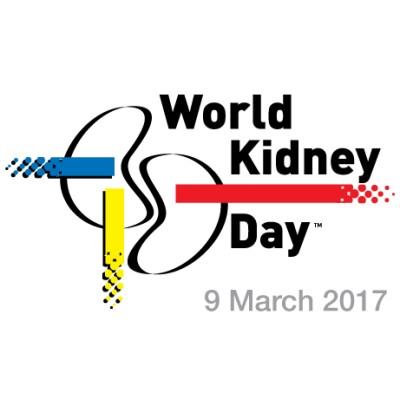World Kidney Day March 9, 2017: Kidney Disease & Obesity
Obesity is defined as abnormal or excessive fat accumulation that may impair health. In 2014, worldwide over 600 million adults were obese.
Obesity is a potent risk factor for the development of kidney disease. It increases the risk of developing major risk factors of Chronic Kidney Disease (CKD), like diabetes and hypertension, and it has a direct impact on the development of CKD and end stage renal disease (ESRD): in individuals affected by obesity, the kidneys have to work harder, filtering more blood than normal (hyperfiltration) to meet the metabolic demands of the increased body weight. The increase in function can damage the kidney and raise the risk of developing CKD in the long-term.
The good news is that obesity, as well as CKD, is largely preventable. Education and awareness of the risks of obesity and a healthy lifestyle, including proper nutrition and exercise, can dramatically help in preventing obesity and kidney disease.
This year World Kidney Day promotes education about the harmful consequences of obesity and its association with kidney disease, advocating healthy lifestyle and health policy measures that make preventive behaviors an affordable option.
The relation between Kidney Disease and Obesity
Kidney disease is more likely to develop in obese people including in those with diabetes and hypertension.
By 2025, obesity will affect 18% of men and over 21% of women worldwide, and that severe obesity will affect 6% of all men and 9% of all women around the world. In some nations, obesity is already present in more than one-third of the adult population and contributes significantly to overall poor health and high annual medical costs.
In the general population, obesity increases the risk of death and contributes to many other diseases such as heart disease, diabetes, hypertension, high cholesterol, obstructive sleep apnea, fatty liver, gall bladder disease, osteoarthritis, various cancers, mental disorders, and poor quality of life.
A growing body of evidence indicates that obesity is also a potent risk factor for the development of chronic kidney disease (CKD) and end-stage renal disease (ESRD). People who are overweight or obese have 2 to 7 more chances of developing ESRD compared to those of normal weight.
Obesity may lead to CKD both indirectly by increasing type 2 diabetes, hypertension and heart disease, and also by causing direct kidney damage by increasing the workload of the kidneys and other mechanisms.
Reducing obesity may reverse or slow CKD progression.
Acute kidney injury (AKI) is a serious condition that develops suddenly, often lasts a short time and may disappear completely once the underlying cause has been treated, but it can also have long-lasting consequences with life-long problems. AKI occurs more frequently in obese people.
Reference:
www.worldkidneyday.org





